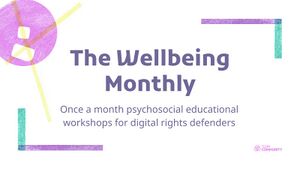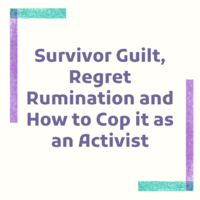Survivor Guilt, Regret Rumination and How to Cop it as an Activist
This session is part of The Wellbeing Monthly 2023, a monthly virtual workshop will be led by diverse mental health professionals, and will focus on psychoeducation and coping mechanisms on diverse topics including anxiety and fear, guilt and survivors guilt, defeat and hopelessness, trauma, and burnout and stress.
- Who: Mathero Michelle Nkhalamba
- Date: Tuesday, July 18
- Time: 9am EDT / 1pm UTC (What time is it in my city?)
- Language: English
- Location: Zoom
👉🏽 RSVP: https://digitalrights.formstack.com/forms/wellbeingmonthly2
Survivor Guilt, Regret Rumination and How to Cope with it as an Activist
Activists are often faced with the challenge of fleeing their countries for their own safety. In addition to adjusting to a new environment and way of living, the decision is riddled with feelings of guilt and worry for those left behind while watching the distressing situation in their home countries deteriorate. The psychological impact of this is unbearable for some and robs them of a peace of mind. The talk will focus on:
- What does survivor guilt look like?
- Regret Rumination and hindsight bias: “I could have done more”
- Coping with survivor guilt as an activist
Mathero Michelle Nkhalamba is a Psychologist, Counsellor and a Researcher with over 17 years of professional experience based in Zomba, Malawi. Her approach to wellbeing is holistic and focuses on preventive mental health which involves delivering psychoeducational workshops, leading therapeutic groups that empower people to take control of their mental health. In this particular space, reminding activists that prioritizing self-care benefits them psychologically and physically and also helps sustain their work in activism longer. She encourages tapping into one’s inner resources, self-awareness, and building resilience by identifying elements that foster or hinder one’s psychological growth. Mathero appreciates the role of social-cultural context in framing clients’ challenges, having had an opportunity to experience different cultures through her work with clients from all over the globe.
Notes & Resources
Presentation & Resources
Presentation
We will upload the presentation soon!
Q&A Section
Is survival guilt always bad?
The function of survival guilt is to cope, like a lot of human mechanisms. It is your mind trying to balance things, so when we experience something like this, our brain can't process it on the way we learn how the world works: bad things happen to bad people). This can be hurtful if we don't work on it on the right way.
How do we do that? We often feel responsible of our environment and of what happens to us. We have to sit down to deal with it and understand our responsibility and we do an interpretation of it.
It can be helpful but if we don't do the work, it can be hurtful: it is not good or bad, you must ask why and then work on it.
What do you suggest we can do when we identify survivor guilt and rumination on someone else?
A lot of times, we feel like we have to deal with survivor guilt on our own. Reach them, help them to process by showing them that you empathize with what they are experiencing. Emphasis in that what they are feeling is collective, that a lot of people share with them this guilt, that they can find support on this.
Difference between the guilt we carry from our childhood (wanting to be a good child) and the survivor guilt
Personal responsibility is upon us in a very young age, even for those things you shouldn't be responsible. It is a way of controlling, even though caregivers don't know they are doing this emotional damage.
It is very present in a lot of religions too, instead of healing or restore, for example.

